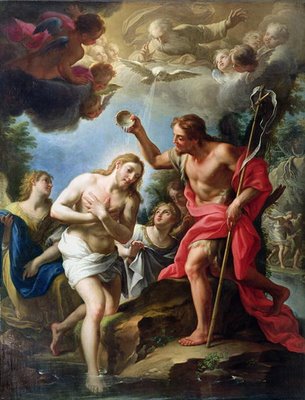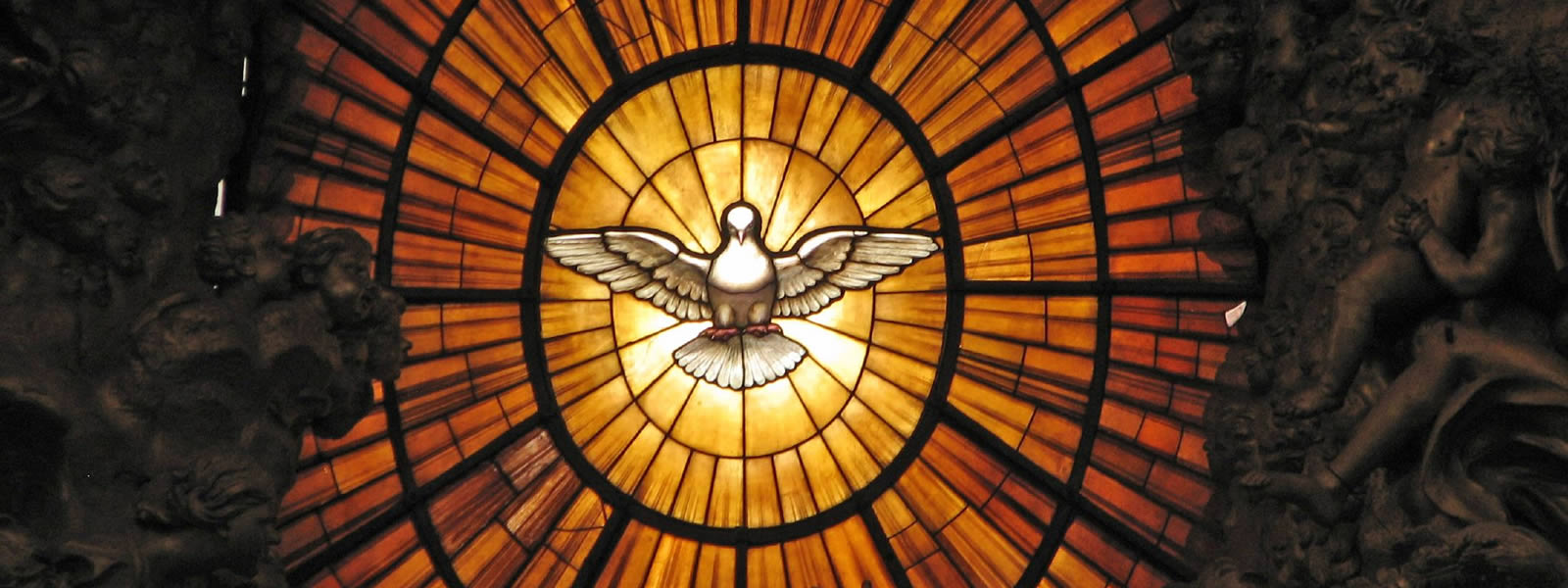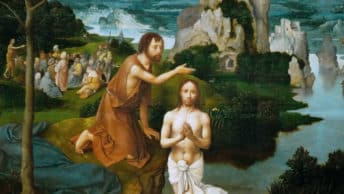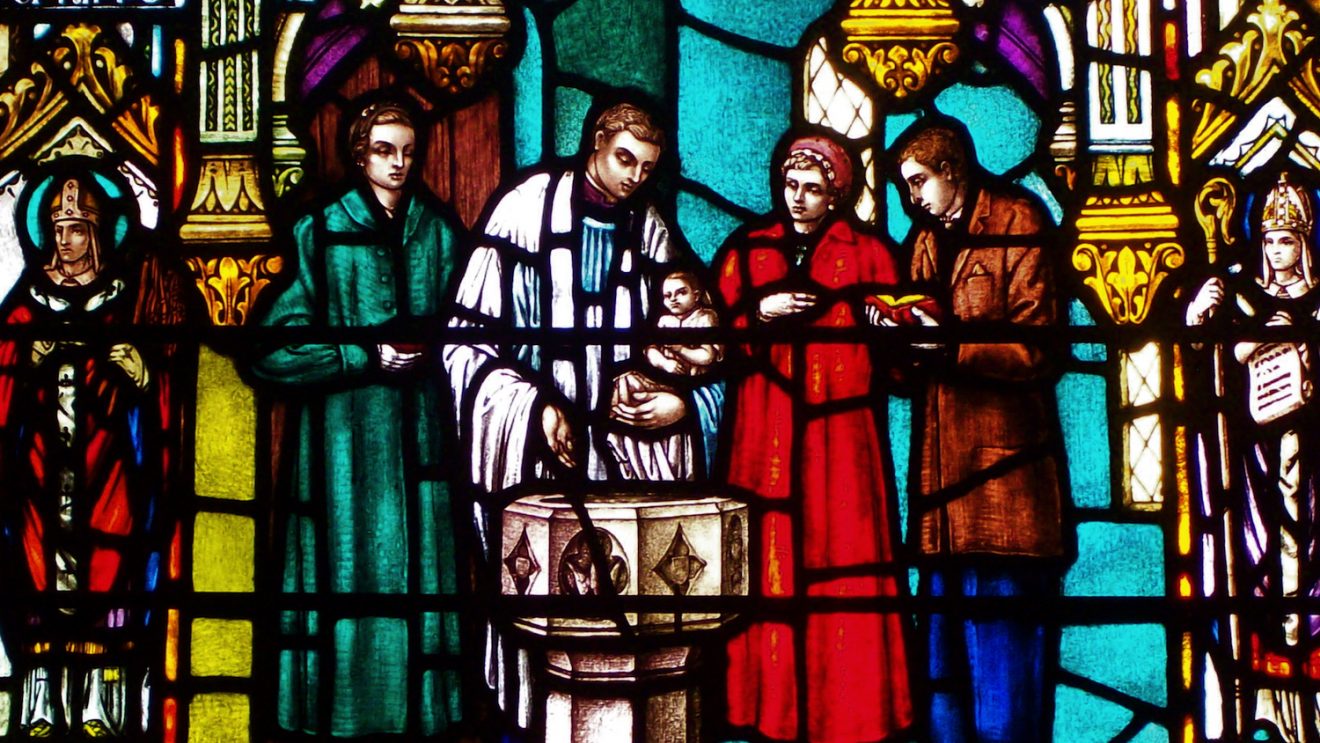 The Gospel of Matthew (3:13-17) recounts for us the Baptism of our Lord Jesus.
The Gospel of Matthew (3:13-17) recounts for us the Baptism of our Lord Jesus.
Baptism is, and always has been, a very important part of our Christian faith.
I am a permanent deacon; and one of the joys of being a deacon is having the opportunity to baptize people into the Church. Since the day of my ordination, I have kept a list of the names of all those whom I have been privileged to baptize into the Catholic Church. To date, there are 1,358 names on the list. Every one of those names represents an infant or a young child. And as I said, I consider it a great privilege to have been given the opportunity to do that.
But have you ever wondered why we have Baptism? As I said, Baptism is and always has been an integral part of our Christian faith, but why? The answer to that question is really very simple. We have Baptism because that is what Jesus told us to do. In fact, when you read the Gospels of Matthew and Mark you find that the directive to baptize is the very last instruction that Jesus gave to His disciples. And Matthew, in his Gospel, is very specific in repeating the words of Jesus. In fact, we call these words of Jesus “The Great Commission”. Jesus said, “Full authority has been given to Me both in heaven and on earth. Go, therefore, and make disciples of all the nations, baptizing them in the name of the Father and the Son and the Holy Spirit. Teach them to observe everything I commanded you. And know that I am with you always; until the end of the world.” (Mt 28:18-20)
The Gospel of Matthew is one of the two Gospels that were originally written by an apostle of Jesus, the other being John. Consequently, that commission, as recorded by Matthew, is very significant because it is a report being given to us by an original eyewitness.
I have some fundamentalist friends who see Baptism as being only an adult experience. They say, for example, that John the Baptist was baptizing only the adults who came out to him. These people heard his message, they repented of their sins, and they were baptized by John as an outward sign of their repentance. It was an adult experience. Consequently, they feel that, similarly, once a person hears the Good News of Jesus Christ and is born again, or receives Jesus as their personal Lord and Savior, they are baptized as an outward sign of their conversion. As such, it becomes an adult experience, and should be reserved for those who are old enough to have attained the age of reason and are capable of making that decision for themselves.
That, however, is inaccurate and incomplete theology, because it ignores the universal nature of Jesus’ invitation. For example, when Peter was speaking to the Israelites after the Pentecostal experience, he said, “You must reform and be baptized, each one of you, in the name of Jesus Christ, that your sins may be forgiven; then you will receive the gift of the Holy Spirit. It was to you and your children that the promise was made, and to all those still far off whom the Lord our God calls.” (Acts 2:38-39) That statement makes it clear that the invitation is universal. It is not restricted to adults only. Peter even specifically mentions the children.
Throughout history, the Catholic Church has always held that Christ’s command to baptize applies to infants as well as adults. This fact was addressed early on by Jesus Himself. Matthew, Mark and Luke all report an incident in which the people were bringing their children and infants to Jesus so that He might touch them. Luke says, “They even brought babies to be touched by Him.” (Lk 18:15) When the disciples saw this, we’re told that the disciples of Jesus began to scold the people and they tried to stop them. But Jesus said, “Let the children come to me. Do not hinder them. The Kingdom of God belongs to such as these.” (Mt 19:14) Jesus did not require the children to make that conscious decision for themselves. On the contrary, He said that the little ones are precisely the kind of people who can come to Him and that the Kingdom belongs to them.
“In the Old Testament, if a man wanted to become a Jew, he had to believe in the God of Israel and be circumcised. In the New Testament, if one wants to become a Christian, one must believe in God and Jesus and be baptized. In the Old Testament, those born into Jewish households could be circumcised in anticipation of the Jewish faith in which they would be raised. Thus, in the New Testament, those born in Christian households can be baptized in anticipation of the Christian faith in which they will be raised. The pattern is the same: If one is an adult, one must have faith before receiving the rite of membership; if one is a child too young to have faith, one may be given the rite of membership in the knowledge that one will be raised in the faith.” (IMPRIMATUR: In accord with 1983 CIC 827, permission to publish this work is hereby granted. +Robert H. Brom, Bishop of San Diego, August 10, 2004)
I could go on with example after example but, suffice to say, the command to baptize is universal, available to all people of all ages. Baptism, therefore, is the initiation process by which one becomes a member of the community of believers. The Catechism of the Catholic Church says, “Through Baptism we are freed from sin and reborn as sons of God; we become members of Christ, are incorporated into the Church and made sharers in her mission.” (CCC 1213)
Baptism washes away all of the past sins committed in one’s life. Infants and young children obviously have no past sins, but Baptism also washes away the stain of Original Sin. Which brings up another obvious question, what is Original Sin?
In order to answer that question, we have to go back to the story of creation that we find in the first three chapters of the Book of Genesis. In those three chapters we find four stories; there is the story of Adam and Eve, Cain and Abel, Noah and the Flood, and the Tower of Babel. And when you look at the basic structure of these four stories, you find that they are all basically the same; mankind’s sin is followed by punishment, which is followed by grace from God. The “sin” in each of these four stories is the same. The snake identified the sin in the very first story. “You will become like gods.” (Gen 3:5)
The Book of Genesis tells us that, “When God created man, he made him in the image and likeness of God. He created them male and female.” (Gen 5:1-2) The story of Adam and Eve makes it clear that since mankind was created in God’s own image, mankind was meant to live in an intimate, loving, trusting relationship with his or her Creator. But in all four of the Genesis stories, mankind oversteps the limits of that loving, trusting relationship and prefers to play God instead. In each of those stories, mankind expresses a desire to be a master of his own destiny rather than trusting in and obeying his Creator.
Sin is deceiving, and that deceit is very subtle. You can see this demonstrated in the very first story. God tells Adam and Eve, “You are free to eat from any tree in the garden except the tree of knowledge of good and evil. From that tree you shall not eat; for the moment you eat from it you are surely doomed to die.” (Gen 2:16-17) But Adam and Eve eat of the fruit and they go on living. The Bible says that Adam lived to a ripe old age of 930 years. So what happened? They ate and they did not die. But, the process began didn’t it? You don’t have to be a scientist to know that every living thing on this planet eventually dies. These mortal bodies of ours will take its last breath at some point in time. Through mankind’s natural propensity to sin, that loving, trusting relationship that we were meant to have with our God has been broken. And as a consequence of that fracture, death has entered our world. From our birth, we are all born with this “rebellious” streak. The concept of Original Sin should be the easiest thing in the world to understand because we are constantly surrounded by its effects. Just look at the daily news. The effects of mankind’s tendency to sin are all around us.
Remember Peter said, “Be baptized and you will receive the gift of the Holy Spirit.” So when the Church says that Baptism removes the stain of Original Sin, the Church is acknowledging the fact that we are all born into this world with a fundamentally flawed or fallen human nature. This fallen human nature can be defined as the deprivation of grace and an inclination toward evil. But through the waters of Baptism, an individual receives the impartation of the Holy Spirit; and through the abiding presence of the Holy Spirit, the baptized person is freed from the permanent effects of this fallen nature. Yes “the inclination toward sin remains; but the grace of Baptism gives the recipient the power to overcome this inclination.” (The necessity of Baptism, The Catholic Thing; by David G. Bonagura)
So, having said all that, I have another question for you. If Baptism removes all of our past sins, both committed and original, why was Jesus baptized? After all, Jesus was baptized by John the Baptist who was preaching a baptism of repentance. Tax collectors and prostitutes were coming to John to be baptized by him in the River Jordan; but why Jesus? Even John the Baptist hesitated when Jesus came to him. Why did Jesus insist on being baptized?
In order to understand the answer to that question, we have to remember that this incident marks the very beginning of Jesus’ earthly ministry. This specific moment in history is an Epiphany, or a revelation, announcing just exactly who Jesus is. The voice from the heavens revealed that information. “This is my beloved Son.” (Mt 3:17) And we’re told that the Spirit of God descends on Him in the form of a dove.
By this baptism, Jesus is allowing Himself to be numbered among the sinners. And He is accepting His assignment, or commission, as God’s Suffering Servant. Knowing that the inevitable consequence of this acceptance is His Crucifixion and death, this baptism is, in all reality, a baptism into that death. We acknowledge and profess the mystery of His death at every Eucharist, “This blood will be shed for you and for all so that sins may be forgiven.”
Jesus, the Word made flesh, was fully human, just like you and I. But as the apostle John said, “In the beginning was the Word; the Word was in God’s presence and the Word was God.” (Jn 1:1) Knowing that Jesus was God in human form, we know that He obviously possessed the fullness of the Holy Spirit from the moment of His conception. By our Baptism, we are blessed with the abiding presence of this same Holy Spirit. And knowing that John saw the Spirit descend upon Jesus in bodily form at His Baptism, those who accept Jesus and are baptized have the confidence in knowing that Jesus has become the source of that same Spirit in their lives.
Today we remember the Baptism of Jesus. By His Baptism, Jesus began His ministry and He accepted His assignment or commission as God’s Suffering Servant. We each have our own individual calling in life. And by our own Baptism, these mortal bodies of ours have literally become the very dwelling place of the Most High God by the presence of His most Holy Spirit that we now possess. May we honor that presence by being faithful to the commission or assignment we’ve been given and by loving and trusting God for His presence and direction in our lives.








